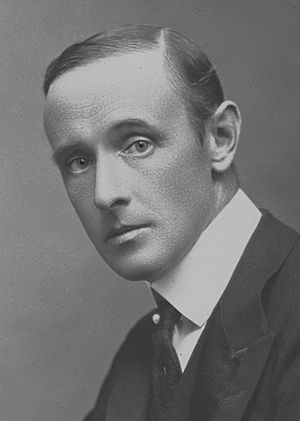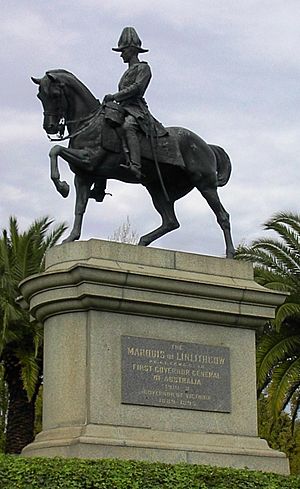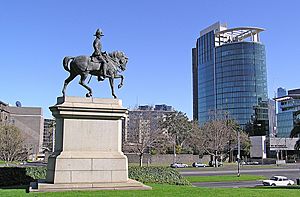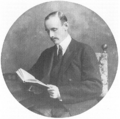John Hope, 1st Marquess of Linlithgow facts for kids
Quick facts for kids
The Most Honourable
The Marquess of Linlithgow
|
|
|---|---|
 |
|
| 1st Governor-General of Australia | |
| In office 1 January 1901 – 17 July 1902 |
|
| Monarch | Victoria Edward VII |
| Prime Minister | Edmund Barton |
| Preceded by | New position |
| Succeeded by | Lord Tennyson |
| 8th Governor of Victoria | |
| In office 28 November 1889 – 12 July 1895 |
|
| Monarch | Victoria |
| Premier | Duncan Gillies James Munro William Shiels James Patterson George Turner |
| Preceded by | Lord Loch |
| Succeeded by | Lord Brassey |
| Secretary for Scotland | |
| In office 2 February 1905 – 4 December 1905 |
|
| Prime Minister | Arthur Balfour |
| Preceded by | Andrew Murray |
| Succeeded by | John Sinclair |
| Personal details | |
| Born | 25 September 1860 South Queensferry, West Lothian, Scotland |
| Died | 29 February 1908 (aged 47) Pau, France |
| Spouse | Hersey Eveleigh-de Moleyns |
| Children | 4 |
John Adrian Louis Hope, 1st Marquess of Linlithgow (born 25 September 1860, died 29 February 1908) was an important British leader. He became the very first Governor-General of Australia, serving from 1901 to 1902. Before that, he was the Governor of Victoria from 1889 to 1895.
Contents
Early Life and Career Beginnings
John Hope was born into a noble family in Scotland. When he was just 12 years old, he became the Earl of Hopetoun after his father passed away. He went to famous schools like Eton College and the Royal Military College, Sandhurst. However, he decided not to become a full-time soldier.
Instead, he joined the Conservative Party and became a member of the House of Lords (a part of the British Parliament). From 1885 to 1889, he served as a Lord-in-Waiting to Queen Victoria, which meant he helped the Queen with her duties. He also represented the Queen at the General Assembly of the Church of Scotland.
Governor of Victoria
At only 29 years old, John Hope was appointed Governor of Victoria in Australia. He did a good job even though Victoria was facing tough political and economic times. He served in this role from 1889 to 1895.
Becoming Governor-General of Australia
After returning to England in 1895, John Hope worked in the government as a Paymaster General and Lord Chamberlain. In July 1900, it was announced that he would be the first Governor-General of Australia. This was a new and very important job, as Australia was about to become a united country.
The Hopetoun Blunder
When he arrived in Australia, John Hope didn't fully understand the political situation around federation. He made a mistake, known as the "Hopetoun Blunder", by asking William Lyne to form the first government. Lyne had actually been against Australia becoming a federation, so he didn't have much support from other politicians.
Because of this, John Hope had to quickly change his mind. He then asked Edmund Barton to become Australia's first prime minister, which was a much better choice.
Time in Office
Once Edmund Barton was prime minister, John Hope's relationship with him was generally polite. However, John Hope sometimes tried to get involved in political decisions, which was not always welcomed.
John Hope was quite popular with the general public. But he also had a reputation for being very grand and spending a lot of money. He wanted a large allowance for his expenses, but the Australian Parliament said no. Because of this disagreement, he decided to leave his position in July 1902.
After he returned to England, he was given the title of Marquess. He mostly stayed out of public life after that, except for a short time in 1905 when he was the Secretary of State for Scotland. Many people think his time as Governor-General was not very successful, and later Governors-General tried to avoid being as extravagant as he was.
Family Life
On 18 October 1886, John Hope married Hersey Everleigh-de-Moleyns. They had four children together:
- Victor Alexander John (born 1887, died 1952)
- Charles (born 1892)
- Jacqueline Alice (born and died in 1896)
- Mary Dorothea
His son, Victor, later became the 2nd Marquess of Linlithgow. Victor also had a very important job as the Viceroy of India from 1936 to 1943, which was a role he had always wanted.
Later Years and Passing
John Hope really wanted to become the Viceroy of India, but he couldn't because of his poor health and political reasons. However, his son Victor did get that job many years later.
His last political role was as Secretary of State for Scotland in 1905. His health continued to be poor, and he sadly passed away suddenly in Pau, France, on 29 February 1908.
Images for kids
 | Jackie Robinson |
 | Jack Johnson |
 | Althea Gibson |
 | Arthur Ashe |
 | Muhammad Ali |






